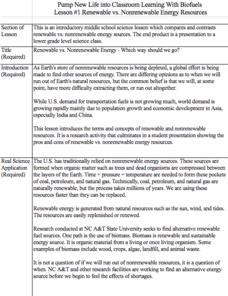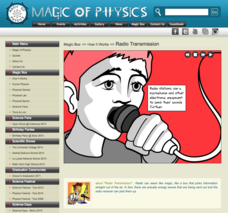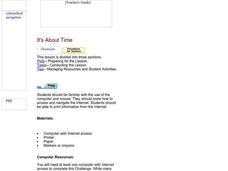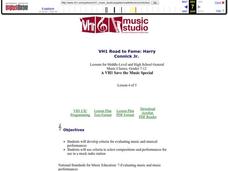Peace Corps
Introducing Culture
Growing up within a culture leaves a lot of ideas and values unspoken. Take a closer look at the cultures in which your learners live with a discussion activity that addresses cultural identity and traits of those living within the...
DLTK
Groundhog Paper Craft
Get crafty this Groundhog's Day with a hands-on activity that combines creativity and making predictions. Scholars color, cut out, and put together a friendly image of a groundhog and showcase whether they feel the weather will be sunny...
Media Education Lab
Sponsored Content as Propaganda
What is sponsored content? Who produces sponsored content? Why? Is it fair or unfair? What are the privacy implications for consumers? To answer these questions, class members view a model screencast before crafting their own that...
Kenan Fellows
Renewable vs. Nonrenewable Energy Resources
Is one type of energy inherently good or bad? Young scientists explore energy resources in a week-long unit. After extensive research, groups create powerful position statements and presentations supporting their energy resource of choice.
Carolina K-12
Political Parties and Conventions
The two major parties polarize many in America today, but it doesn't have to be that way in the classroom! Teach learners about political party platforms and modern campaigns with a mock political convention. After watching a PowerPoint...
Magic of Physics
Radio Transmission
Radio waves are all around us! How do they transmit sound? Using an interactive, scholars examine how songs travel through the air. The resource explains the process from the radio station, to signal towers, to the radio unit. A look at...
North Carolina Consortium for Middle East Studies
Using Drama to Address Social Justice Issues in School and the Community
Artists, musicians, and dramatists have long been the leaders in the quest for social justice. To gain an understanding of the power of the arts to address social issues, class members listen to a reading of Drew Daywalt's The Day the...
Facing History and Ourselves
Free Press Makes Democracy Work
A unit study of the importance of a free press in a democracy begins with class members listening to a podcast featuring two journalists, one from a United States public radio station and one from Capetown, South Africa. The lesson plan,...
Crabtree Publishing
Why Does Media Literacy Matter?
Criticism of news and entertainment journalism is at an all-time high. Help 21st-century learners develop the media literacy skills they need to become critical consumers with a three-lesson guide the looks at persuasive techniques used...
Curated OER
It's About Time: Olympics, Winter Sports, Math, Media, Time Zones
Students use the Internet to determine broadcast times for the Winter Olympic Games snowboarding competitions. In determining these times, they need to consider time zones throughout the world.
Curated OER
VH1 Road to Fame: Harry Connick Jr.
Students are divided into groups of employees of a jazz radio station and a classical radio station. They role play their own broadcasts.
Curated OER
Meteorologist Me: Climate and Weather Case Study
Fifth graders research weather and climate for selected cities and create identification cards within a database. They prepare an oral presentation on a simulated on-location weather broadcast.
Curated OER
Americas Idols
Young scholars engage in a lesson that is concerned with the concept of American Idol and the controversy that surrounds the broadcast. They conduct research using a variety of resources and write paragraphs that state opinions about the...
Curated OER
The Viking Legends - In the Beginning
Students listen to a broadcast with two stories on a radio that deals with Viking legends: The Building of the Wall and a creation story similar to Genesis. They discuss each story, write a short scene from one of the stories and then...
Curated OER
Boombox Classroom: Joe Trio
In this music worksheet, students listen to the Boombox Classroom radio broadcast. Students then answer a question about the piano trio.
Curated OER
Editorial Writing: What's On Your Mind
Students write an editorial column for a newspaper. For this journalism lesson, students discuss and analyze editorials in print and broadcast media. Students will compare the differences in these two formats of editorial pieces and then...
Curated OER
Exploratory: News Casting
Pupils report on an assigned topic in a simulated news story. In this 1960s lesson, students pretend to be a reporter in the 1960s and work in groups to create a news story on an assigned topic having to do with the Civil Rights...
Maine Content Literacy Project
Introduction to Literacy Criticism
As learners continue to examine a short story of their choice, they take some time to look at analysis completed by others on the same story. In the eleventh lesson in a series of fourteen, pupils explore various sites for literary...
Curated OER
Media Literacy Skills
Third graders watch a news story from three different networks in order to determine how the same story can be presented in three different ways. Next, working in small groups they create a newscast of a current event to share with the...
Curated OER
Geography
Students, after hearing a radio broadcast on 'A Day in School Abroad,' explore and study the lives and experiences of children in a variety of places. They assess the advantages and disadvantages of living on a small island, find out...
Curated OER
Ethical Applications of Human Genetics
Tenth graders read about, observe case study videos, and participate in live interactive broadcasts, and maintain a log book on all of the activities pertaining to the Human Genome Project.
Curated OER
Peace Be Still (The Peace of Jesus)
Students listen to and discuss story of Jesus calming storm, write script containing interview questions, create background with props, make video of newscast, and illustrate memory verse or symbol of peace using KidPix software.
Curated OER
Water: to the Last Drop
Middle schoolers research how water played an important role in US history. In this social studies lesson, students make a mock newscast from one of the events they researched. They present their newscast to the class.
Curated OER
Why Predict?
Twelfth graders examine the process of predicting. They observe a fine art transparency, discuss their predictions about the artwork, identify the types of predictions made during a weather broadcast, and evaluate headlines from...
Other popular searches
- Radio Broadcasts
- News Broadcasts
- School Broadcasts
- Television Broadcasts
- Comparing Tv News Broadcasts
- Internet Broadcasts
- Internet Broadcasts Prek
- Internet Broadcasts Perk

























